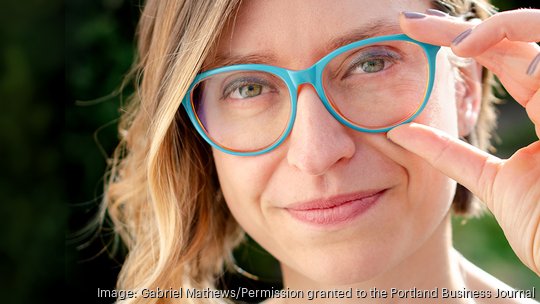
Amina Moreau, a Portland Business Journal 40 Under 40 winner in 2022, recently reached out following news of the "substantial doubt" surrounding coworking company WeWork's ability to stay in business.
Her company, Radious, is an "office marketplace," allowing customers to rent space in other people's homes, where they can then work.
The Business Journal caught up with Moreau by email to get her take on the future of offices. The following has been edited for brevity and clarity.
You're a proponent of the third place — a space that's not the traditional office or a worker's home, but rather a third space where they can go to work. As you've said, you want your company to be "the Airbnb of workspaces." What are the challenges and tailwinds you have faced so far in fully legitimizing that as a business model?
Our biggest challenge is the sheer number of companies wishing they could relinquish their leases but can't. This makes it difficult for a "third place" platform like Radious to convince them to spend even more money on additional space — even if our workspaces are more desirable for employees and would help with engagement and talent retention. However, as American City Business Journals has reported, about 55% of the leases active in January 2020 haven't yet expired, according to an analysis by CoStar Group Inc. This presents a big opportunity for Radious as lease terms end and companies begin to explore other, more flexible options.
In addition to this opportunity, we have several other factors contributing to tailwinds, not least of which is the trend of workers preferring to stay in their neighborhoods for their workdays. The No. 1 barrier to returning to any office is the commute, which is why we have focused on growing our network of workspaces in residential areas, right in employees' neighborhoods. This makes Radious far more attractive to workers by saving them time, money and fossil fuels.
What has the customer response been?
Supply-side: Homeowners are finding that they can offset some or all of their mortgage payments via Radious income. In contrast with overnight platforms like Airbnb, for example, Radious attracts a more professional, conscientious guest (working professionals) and leaves the host without any linens to wash. More money with less work and less risk.
Demand-side: Many companies are questioning the need to pay for a lease seven days per week when their employees only use it once or twice. With on-demand solutions like Radious, companies never need to pay for unused real estate again. In addition, our spaces are, on average, less than half the price of other options like traditional co-working spaces or hotel conference rooms.
In addition, our spaces are distributed all across the Portland region. So aside from reducing commute times in many cases, having such a network gives teams the ability to bounce around to different workspaces and neighborhoods, patronizing various lunch spots and pubs for team happy hours. It’s a great way to explore the city together while supporting local businesses.
If the future of downtowns is not going to an office to work as frequently as before, what do you envision the future of downtowns should be? More specifically, what should downtown Portland's function in our community be?
Livability. I believe that our collective focus should be on making downtowns more livable through a combination of commercial-to-residential conversions (where possible), construction of new and affordable housing, and investing in green spaces for community gathering.
Encouraging people to live downtown and building infrastructure that inspires togetherness would address the shortage of foot traffic supporting small shops, mitigate the housing shortage crisis, and reduce safety issues. As countless studies have shown, community-oriented neighborhoods tend to show a reduction in crime and an increase in overall safety. I'm thrilled to see that some of this is already starting to happen.



